新概念51~60
新概念L51-60详细笔记
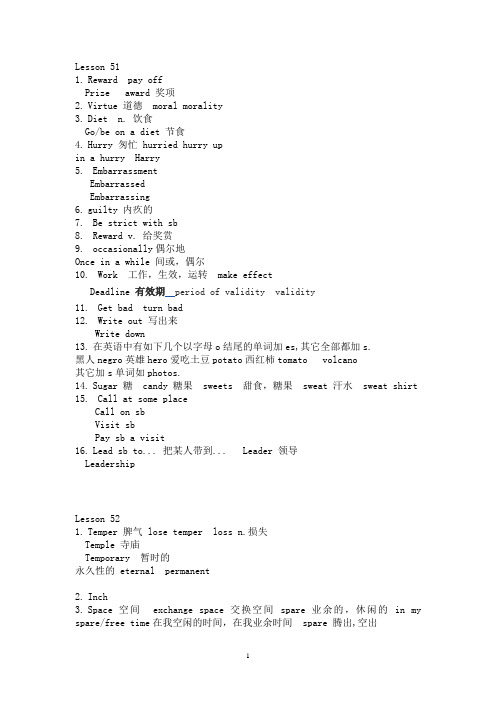
Lesson 511.Reward pay offPrize award 奖项2.Virtue 道德 moral morality3.Diet n. 饮食Go/be on a diet 节食4.Hurry 匆忙 hurried hurry upin a hurry Harry5. EmbarrassmentEmbarrassedEmbarrassing6.guilty 内疚的7. Be strict with sb8. Reward v. 给奖赏9. occasionally偶尔地Once in a while 间或,偶尔10. Work 工作,生效,运转 make effectDeadline 有效期period of validity validity11. Get bad turn bad12. Write out 写出来Write down13.在英语中有如下几个以字母o结尾的单词加es,其它全部都加s.黑人negro英雄hero爱吃土豆potato西红柿tomato volcano其它加s单词如photos.14.Sugar 糖 candy 糖果 sweets 甜食,糖果 sweat 汗水 sweat shirt15. Call at some placeCall on sbVisit sbPay sb a visit16.Lead sb to... 把某人带到... Leader 领导LeadershipLesson 521.Temper 脾气 lose temper loss n.损失Temple 寺庙Temporary 暂时的永久性的 eternal permanent2.Inch3.Space 空间 exchange space 交换空间 spare 业余的,休闲的 in my spare/free time在我空闲的时间,在我业余时间 spare 腾出,空出4.备用的 spare tyre5.Actually speakingPersonally speakingGenerally speakingAs a matter of factIn factExactly speaking,具体的说,确切的说6.Pretty beautiful7. Be made of 由...构成(看得见原材料)Be made from... 由...构成(看不见原料)8.Get sth in order 使...井然有序I can get everything in order. ManageI have the ability of getting everything in order.I am capable of getting everything in order.9. Own 某人拥有的It's my own right.Owe 亏欠 owe toI owe you. I OY 欠条10.Rather 相当 (接含有贬义的形容词)Quite 相当(接含有褒义的形容词)11.At present 目前,此时 at the moment12. Bookshelf13. Add upLesson 531. Course 课程Cause 导致,引起2.Corpse =remains3. Line wire4. Solve the problemAnswer the question5. Mystery 谜Myth 神话 mysterious adj.神秘的riddle 谜语6. Snatch =catch7. Spark触电[chù diàn]get an electric shockelectric shock8. Be on firecatch firePut out firePut on put awayPut off 推迟 postpone delayFind out = figure outThrow up = vomit9.Cigar tobacco 烟草 cigarette 香烟A package of cigarettes 一包香烟10.Wind v.缠绕 woundFind found found found v.成立The company was founded in 2009.11.In this situation/case12.Explain explanation13. Eagle 老鹰Lesson 541.Stick to 坚持Stick to it, you will win at last.Persist in doing sthInsist on doing sth2.Finger palm 手掌 fingernail 指甲 toe 脚趾3. Blueberry pie4. Mix A with BMixture 混合物5.Annoy vt. 使烦恼Annoyed annoying6.Dismay upset 沮丧的Desperate depressedLet sb down 让...失望7.Recognize recognition n. 认出,听出 know realise8.Persuade 劝说,说服某人做某事Persuade sb to do sthPersuasion 说服9.Mess What a mess!Messy adj. 乱糟糟的10.Sign signature 签名 sign your name,please. Sigh v. 叹气11.Register registration n. 注册, 挂号邮寄挂号12.Interrupt disturbInterpretation13. Go to the shop 去商店买东西 do some shopping = go shoppingGo to shopping 不对14.Quiet 安静的 quite 相当 quite goodRather bad15.In a short time= shortly16.At exactly that moment= Just at that moment17.Be busy with sth...Be busy (in) doing sth18.No sooner... than...一...就... Hardly when19. Enough 修饰名词放在名词的前面,修饰形容词或者副词要放在形容词或副词的后面Lesson 551.Gold 金子 sperm 精子 egg 卵子 silver copperGolden fish 金鱼2.Mine 矿3.Treasure possession 所有物,财产4. Detect revealerreveal 揭示5. Invent discover6. Caveman wildman7. Seashore beach bitch8. Pirate 海盗,盗版 private 私人的9. Arm 胳膊 arms 武器 weapon 武器 arm v. 武装10.Soil sand mud 泥巴 muddy11. Entrance exit12. Finally at lastEventually13.Worth worthyBe worth doingWorthless14.Thoroughly 彻底地 completely totally through 纵穿 though 虽然,但是15. Trunk 树桩,象鼻,行李箱 luggage baggage16.Confident = confidence17. Value = valuable invaluable 无价的unvaluable 便宜的expensive 昂贵的inexpensive 便宜的Lesson 551.Find 找的过程 find out 找的结果2. Dream come true3. Be used to do sth 被用来做什么Be used to doing sth习惯做某事Used to do sth 过去常常做某事4.Thoroughly completely 完全地,彻底地, totally5.In spite of... = however 尽管...Lesson 561.Sound voice noise2. Wheel whale3. Explode v.爆炸 explosion4. Rival = competitor5. Speed up 加速slow down 减速,说慢一点6. Relay race 接力赛Race match competition fierce 激烈的7. Enter 进入 enter for 参加...比赛8. At the speed of... 以...速度Lesson 571.Pants underwear 内衣 T-back2.No hesitation.3. Service servant4. Punish 惩罚 punishment publish 出版 press n.新闻媒介 press conference 新闻发布会5.eagle n.鹰Be eager to...Be eager to do sth6. Look down upon sb 瞧不起我 glance at sb7.非谓语由谓语动词变化的动词形式叫非谓语, 比如: v-ing, v-ed, to do sth8.Enjoy doingLesson 581.Disguise v.伪装 pretendDisgusting adj. 恶心的2.Possession3.Curse 诅咒4. Increase reduce5. Eggplant6. Church pray7.Reputation fame8.Cut down cut into pieces chop v.切,砍,n.排骨9.It is +动词过去分词+ that... 表示据...It is reported that...It is said that...10.Mention 提到,说到11.No pay, no gain.12.No pain, no gain.13.Have sth done 让某事被做 The clock doesn't work, we had better haveit repaired.14.Point at 指着 point to 指向 point out指出Lesson 591.Press pressure2.Paw3.DevelopmentDeveloping countryDeveloped country4.Habit 习惯 hobby兴趣,爱好5. Complain of/about...6. Develop form 养成 from 来自于...Lesson 601.Future in future 在未来,抽象 in the future 从今往后的未来2.Fair 公平的 unfairn. 集市 marketFlea market3.Fortunately 幸运的是Unfortunately4.Crystal diamond5. Relation relate v.Related 有关系的,有联系的 relative n. 亲戚 relationship 关系friendship 友谊6.Patient n. 病人 adj. 有耐心的 Be patientPatience impatientsuperstition n. 迷信7.Decide to do sth 决定去做某事Intend to do sth 打算,计划做某事8. Visit call at /on9. The moment = as soon as ...一...就10. Knowknow about 了解Learn learn about11.Rush hour 高峰期12. Speak to 对某人讲Speak with...和某人讲话Speak about...13.Lead in toLead awayLeaderLeadership14.Because 后面接句子 because of 接短语或者名词15. Meet 接某人,会见某人 pick up 用车接载某人 meet with sb 偶遇, 不期而遇Superstition 迷信。
新概念应第二册课后练习答案lesson51--60
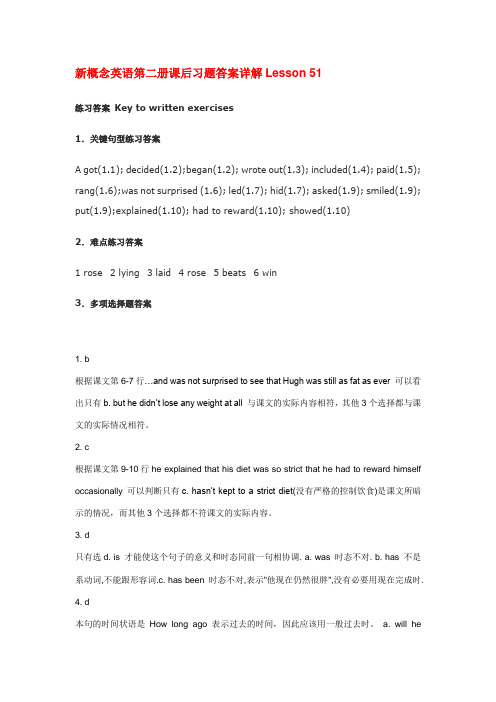
新概念英语第二册课后习题答案详解Lesson 51练习答案Key to written exercises1.关键句型练习答案A got(1.1); decided(1.2);began(1.2); wrote out(1.3); included(1.4); paid(1.5); rang(1.6);was not surprised (1.6); led(1.7); hid(1.7); asked(1.9); smiled(1.9); put(1.9);explained(1.10); had to reward(1.10); showed(1.10)2.难点练习答案1 rose2 lying3 laid4 rose5 beats6 win3.多项选择题答案1. b根据课文第6-7行…and was not surprised to see that Hugh was still as fat as ever 可以看出只有b. but he didn’t lose any weight at all 与课文的实际内容相符,其他3个选择都与课文的实际情况相符。
2. c根据课文第9-10行he explained that his diet was so strict that he had to reward himself occasionally 可以判断只有c. hasn’t kept to a strict diet(没有严格的控制饮食)是课文所暗示的情况,而其他3个选择都不符课文的实际内容。
3. d只有选d. is 才能使这个句子的意义和时态同前一句相协调. a. was 时态不对. b. has 不是系动词,不能跟形容词.c. has been 时态不对,表示"他现在仍然很胖",没有必要用现在完成时.4. d本句的时间状语是How long ago 表示过去的时间,因此应该用一般过去时。
(完整版)新概念一册第51-60分课练习和内附答案
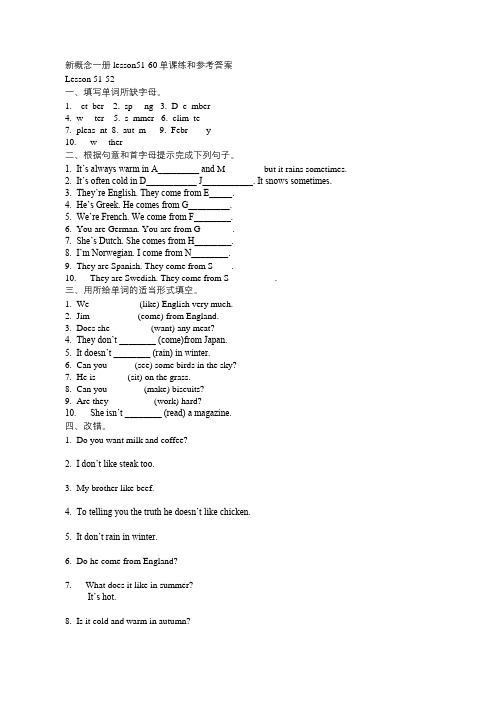
新概念一册lesson51-60单课练和参考答案Lesson 51-52一、填写单词所缺字母。
1. _ct_ber2. sp_ _ng3. D_c_mber4. w_ _ter5. s_mmer6. clim_te7. pleas_nt 8. aut_m_ 9. Febr_ _ _y10. w_ _ther二、根据句意和首字母提示完成下列句子。
1. It’s always warm in A_________ and M________ but it rains sometimes.2. It’s often cold in D___________ J___________. It snows sometimes.3. They’re English. They come from E_____.4. He’s Greek. He comes from G_________.5. We’re French. We come from F________.6. You are German. You are from G_______.7. She’s Dutch. She comes from H________.8. I’m Norwegian. I come from N________.9. They are Spanish. They come from S____.10. They are Swedish. They come from S__________.三、用所给单词的适当形式填空。
1. We __________ (like) English very much.2. Jim __________(come) from England.3. Does she ________ (want) any meat?4. They don’t ________ (come)from Japan.5. It doesn’t ________ (rain) in winter.6. Can you _____ (see) some birds in the sky?7. He is ______ (sit) on the grass.8. Can you _______ (make) biscuits?9. Are they _________ (work) hard?10. She isn’t ________ (read) a magazine.四、改错。
新概念英语单词51-60课
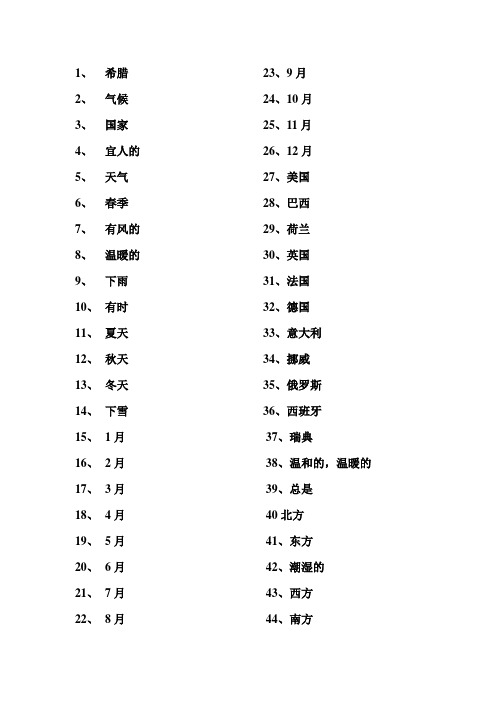
1、希腊23、9月
2、气候24、10月
3、国家25、11月
4、宜人的26、12月
5、天气27、美国
6、春季28、巴西
7、有风的29、荷兰
8、温暖的30、英国
9、下雨31、法国
10、有时32、德国
11、夏天33、意大利
12、秋天34、挪威
13、冬天35、俄罗斯
14、下雪36、西班牙
15、1月37、瑞典
16、2月38、温和的,温暖的
17、3月39、总是
18、4月40北方
19、5月41、东方
20、6月42、潮湿的
21、7月43、西方
22、8月44、南方
45、季节67、尼日利亚
46、最68、尼日利亚人
47、夜晚69、土耳其
48、升起70、土耳其人
49、早71、韩国
50、落下去72、波兰人
51、晚、迟73、波兰
52、有趣的,有意思的74、泰国人
53、话题75、泰国
54、谈话76、住,生活
55、澳大利亚77、呆在,停留
56、澳大利亚人78、家,在家,到家
57、奥地利79、家务
58、奥地利人80、午饭
59、加拿大81、下午
60、加拿大人82、通常
61、中国83、一起
62、芬兰84、晚上
63、芬兰人85、到达
64、印度86、夜间
65、印度人87、点钟
66、日本88、商店
89、片刻,瞬间
90、信封
91、信纸
91、售货员
92、尺寸,尺码,大小
93、信笺簿
94、胶水
95、粉笔
96、零钱,找给的钱。
新概念一册第51-60分课练习和内附答案

新概念一册lesson51-60单课练和参考答案Lesson 51-52一、填写单词所缺字母。
1. _ct_ber2. sp_ _ng3. D_c_mber4. w_ _ter5. s_mmer6. clim_te7. pleas_nt 8. aut_m_ 9. Febr_ _ _y10. w_ _ther二、根据句意和首字母提示完成下列句子。
1. It’s always warm in A_________ and M________ but it rains sometimes.2. It’s often cold in D___________ J___________. It snows sometimes.3. They’re English. They come from E_____.4. He’s Greek. He comes from G_________.5. We’re French. We come from F________.6. You are German. You are from G_______.7. She’s Dutch. She comes from H________.8. I’m Norwegian. I come from N________.9. They are Spanish. They come from S____.10. They are Swedish. They come from S__________.三、用所给单词的适当形式填空。
1. We __________ (like) English very much.2. Jim __________(come) from England.3. Does she ________ (want) any meat?4. They don’t ________ (come)from Japan.5. It doesn’t ________ (rain) in winter.6. Can you _____ (see) some birds in the sky?7. He is ______ (sit) on the grass.8. Can you _______ (make) biscuits?9. Are they _________ (work) hard?10. She isn’t ________ (read) a magazine.四、改错。
新概念英语一 lesson 51-60
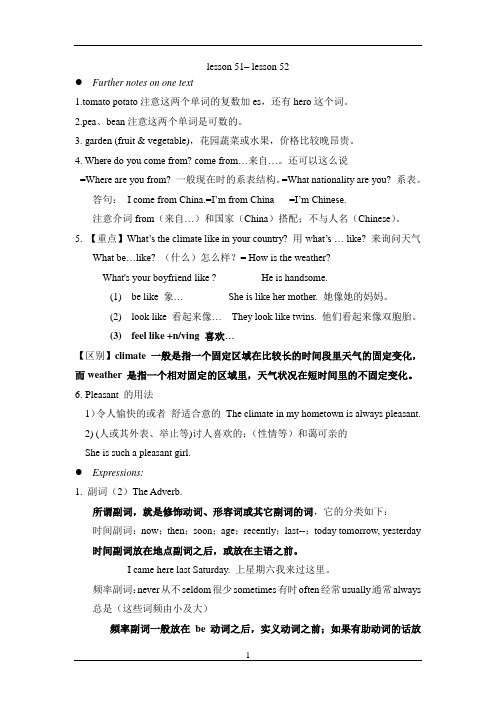
lesson 51– lesson 52●Further notes on one text1.tomato potato注意这两个单词的复数加es,还有hero这个词。
2.pea、bean注意这两个单词是可数的。
3. garden (fruit & vegetable),花园蔬菜或水果,价格比较晚昂贵。
4. Where do you come from? come from…来自…。
还可以这么说=Where are you from? 一般现在时的系表结构。
=What nationality are you? 系表。
答句:I come from China.=I’m from China =I’m Chinese.注意介词from(来自…)和国家(China)搭配;不与人名(Chinese)。
5. 【重点】What’s the climate like in your country? 用what’s … like? 来询问天气What be…like? (什么)怎么样?= How is the weather?What's your boyfriend like ? He is handsome.(1) be like 象… She is like her mother. 她像她的妈妈。
(2) look like 看起来像… They look like twins. 他们看起来像双胞胎。
(3) feel like +n/ving 喜欢…【区别】climate 一般是指一个固定区域在比较长的时间段里天气的固定变化,而weather 是指一个相对固定的区域里,天气状况在短时间里的不固定变化。
6.Pleasant 的用法1)令人愉快的或者舒适合意的The climate in my hometown is always pleasant.2) (人或其外表、举止等)讨人喜欢的;(性情等)和蔼可亲的She is such a pleasant girl.●Expressions:1. 副词(2)The Adverb.所谓副词,就是修饰动词、形容词或其它副词的词,它的分类如下:时间副词:now;then;soon;age;recently;last--;today tomorrow, yesterday 时间副词放在地点副词之后,或放在主语之前。
新概念英语第一册笔记51-60教学内容
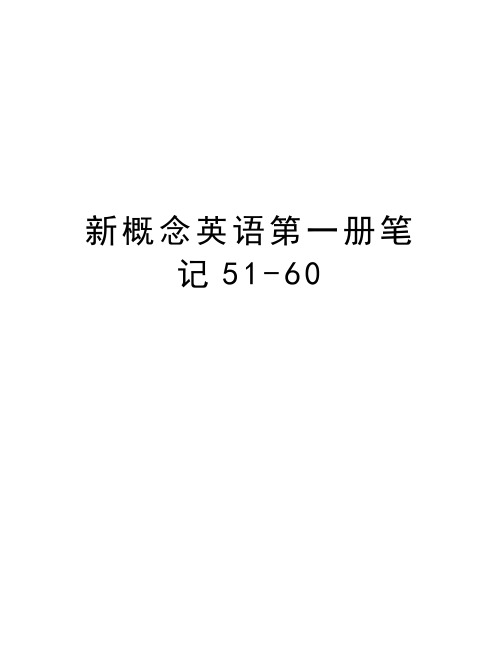
新概念英语第一册笔记51-60新概念英语第一册笔记Lesson 51 Apleasant climate一、单词讲解1、GreeceGreece n. 希腊(国名)eg. Where does Jim come from?eg. Jim comes from Greece.eg. Where is Jim from?He’s from Greece.Greek n. 希腊人(国箱) adj. 希腊的eg. What nationality is Mr. White?He is Greek.eg. I am a Greek engineer.eg. Are they Greek doctors?Yes, they are.No, they aren’t.2、climateclimate n. 气候eg. What’s the climate like in your country? eg. I don’t like the climate here.3、countrycountry n. 国家eg. China is a big country.eg. Do you like this country?Yes, I do.4、pleasantpleasant1) adj. 天气宜人的eg. It’s quite pleasant today.2) adj. 令人愉悦的eg. What a pleasant surprise! 多么好的一个惊喜呀!eg. The flower gives off a pleasant smell. 这支花散发出一种令人愉悦的香味。
3)adj. 可亲的,友好的eg. Her mother is a pleasant woman.eg. Wendy is very pleasant.a pleasant smile4、weatherweather n. 天气(短时间内天气变化)climate n. 气候(长时间的天气状况)eg. What’s the weather like today?good weather 好天气=nice weatherweather forecast 天气预报weather bureau 气象局under the weather: not very well or happy 感觉不是很好或不是很高兴weather beaten:岁月侵蚀的,饱经风霜的the weather beaten rocks:风雨侵蚀的岩石a weather beaten face:沧桑的脸4、spring收集于网络,如有侵权请联系管理员删除spring1) n. 春季eg. My father likes spring.eg. Do you like spring?Yes, I do.No, I don’t.2) n. 弹簧5、windywindy adj. 有风的eg. What’s the weather like today?eg. It’s windy.wind n. 风eg. There is much wind today. 今天风很大。
新概念II课文-51-60

When I asked him what he was doing, he smiled guiltily and then put the parcel on the desk.
He explained that his diet was so strict that he had to reward himself occasionally.
You can sit here in your spare time and read the carpet!'
Book II Lesson 53
Hot snake ′¥μ?μ?é?At last firemen have put out a big forest fire in California.
The most unusual car was a Benz which had only three wheels.
Built in 1885, it was the oldest car taking part.
After a great many loud explosions, the race began.
He began his diet a week ago.
First of all, he wrote out a long list of all the foods which were forbidden.
The list included most of the things Herbert loves: butter, potatoes, rice, beer, milk, chocolate, and sweets.
新概念1册51-60课单词
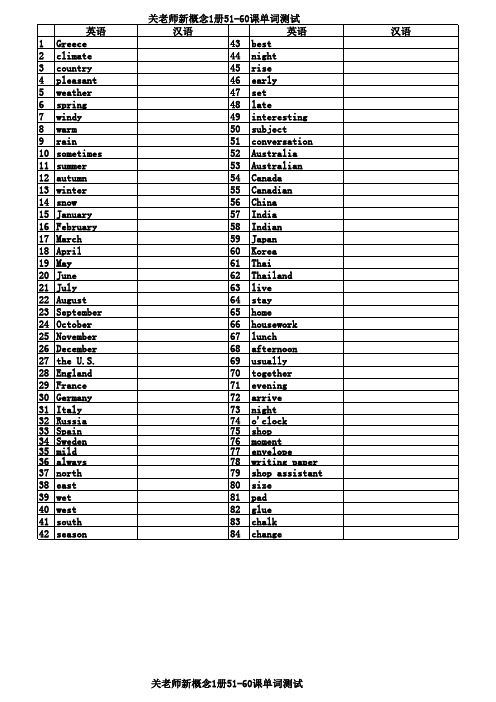
英语 36 37 38 39 40 41 42 43 44 45 46 47 48 49 50 51 52 53 54 55 56 57 58 59 60 61 62 63 64 65 66 67 68 69 70
汉语
南方 季节 最 夜晚 升起 早 (太阳)落下去 晚,迟 有趣的,有意思的 话题 谈话 中国 日本 住,生活 呆在,停留 家 ;在家,到家 家务 午饭 下午 通常 一起 晚上 到达 夜间 点钟 商店 片刻,瞬间 信封 信纸 售货员 尺寸,尺码,大小 信笺簿 胶水 粉笔 零钱,找给的钱
1 2 3 4 5 6 7 8 9 10 11 12 13 14 15 16 17 18 19 20 21 22 23 24 25 26 27 28 29 30 31 32 33 34 35 36 37 38 39 40 41 42
新概念51到60课原文及译文

Lesson51A pleasant climate 宜人的气候HANS: Where do you come from? 你是哪国人?DIMITRI: I come from Greece. 我是希腊人。
HANS: What's the climate like in your country?你们的国家的气候是怎么样?DIMITRI: It's very pleasant. 气候非常宜人。
HANS: What's the weather like in spring? 春季的天气怎么样?DIMITRI: It's often windy in March. 3 月里常常刮风。
It's always warm in April and May,4 月和5 月的天气总暖洋洋的,but it rains sometimes. 但有时下雨。
HANS: What's it like in summer? 夏季的天气如何呢?DIMITRI: It's always hot in June, July and August.6 月、7 月和8 月的天气总是炎热的The sun shines every day. 每天都出太阳。
HANS: Is it cold or warm in autumn? 秋季的天气是冷还是暖呢?DIMITRI: It's always warm in September and October.9 月和10 月总是很暖和,It's often cold in November and it rains sometimes.11 月常常就冷了,而且有时下雨。
HANS: Is it very cold in winter? 冬季的天气很冷吗?DIMITRI: It's often cold in December, January and February.12 月、1 月和2 月常常很冷,It snows sometimes. 有时还下雪。
新概念英语第一册课文语法详解51-60
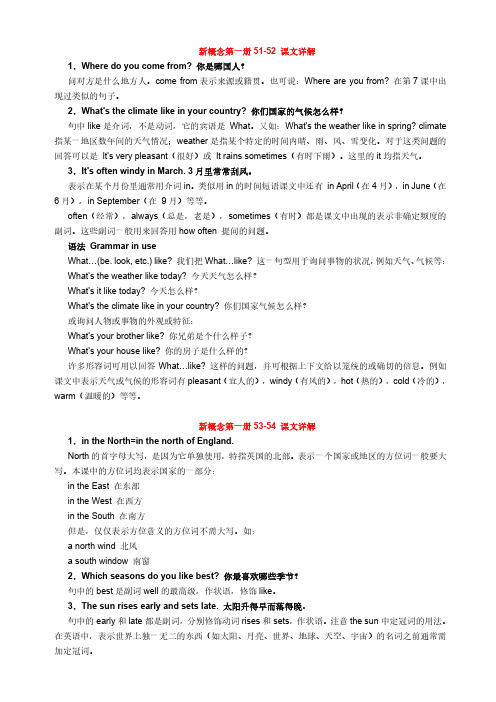
新概念第一册51-52 课文详解1.Where do you come from? 你是哪国人?问对方是什么地方人。
come from表示来源或籍贯。
也可说:Where are you from? 在第7课中出现过类似的句子。
2.What's the climate like in your country? 你们国家的气候怎么样?句中like是介词,不是动词,它的宾语是What。
又如:What's the weather like in spring? climate 指某一地区数年间的天气情况;weather是指某个特定的时间内晴、雨、风、雪变化。
对于这类问题的回答可以是It's very pleasant(很好)或It rains sometimes(有时下雨)。
这里的it均指天气。
3.It's often windy in March. 3月里常常刮风。
表示在某个月份里通常用介词in。
类似用in的时间短语课文中还有in April(在4月),in June(在6月),in September(在9月)等等。
often(经常),always(总是,老是),sometimes(有时)都是课文中出现的表示非确定频度的副词。
这些副词一般用来回答用how often 提问的问题。
语法Grammar in useWhat…(be. look, etc.) like? 我们把What…like? 这一句型用于询问事物的状况,例如天气、气候等:What's the weather like today? 今天天气怎么样?What's it like today? 今天怎么样?What's the climate like in your country? 你们国家气候怎么样?或询问人物或事物的外观或特征:What's your brother like? 你兄弟是个什么样子?What's your house like? 你的房子是什么样的?许多形容词可用以回答What…like? 这样的问题,并可根据上下文给以笼统的或确切的信息。
新概念51--60单词
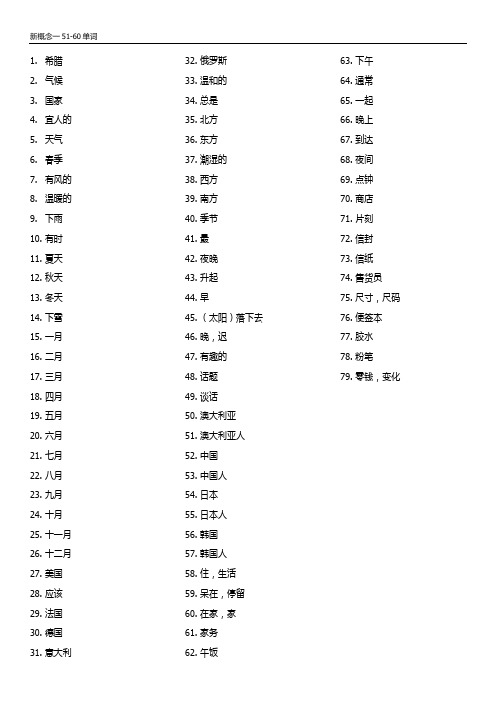
新概念一51-60单词
1.希腊
2.气候
3.国家
4.宜人的
5.天气
6.春季
7.有风的
8.温暖的
9.下雨
10.有时
11.夏天
12.秋天
13.冬天
14.下雪
15.一月
16.二月
17.三月
18.四月
19.五月
20.六月
21.七月
22.八月
23.九月
24.十月
25.十一月
26.十二月
27.美国
28.应该
29.法国
30.德国
31.意大利32.俄罗斯
33.温和的
34.总是
35.北方
36.东方
37.潮湿的
38.西方
39.南方
40.季节
41.最
42.夜晚
43.升起
44.早
45.(太阳)落下去
46.晚,迟
47.有趣的
48.话题
49.谈话
50.澳大利亚
51.澳大利亚人
52.中国
53.中国人
54.日本
55.日本人
56.韩国
57.韩国人
58.住,生活
59.呆在,停留
60.在家,家
61.家务
62.午饭
63.下午
64.通常
65.一起
66.晚上
67.到达
68.夜间
69.点钟
70.商店
71.片刻
72.信封
73.信纸
74.售货员
75.尺寸,尺码
76.便签本
77.胶水
78.粉笔
79.零钱,变化。
新概念英语一(51-60) -
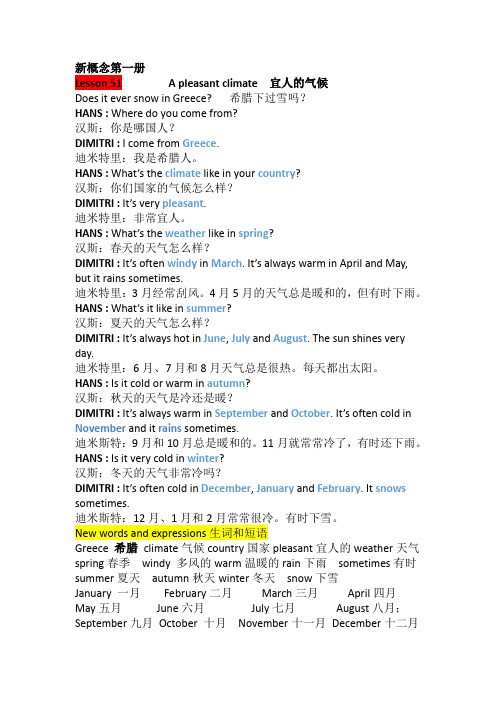
Lesson 51 A pleasant climate 宜人的气候Does it ever snow in Greece? 希腊下过雪吗?HANS : Where do you come from?汉斯:你是哪国人?DIMITRI : I come from Greece.迪米特里:我是希腊人。
HANS : What’s the climate like in your country?汉斯:你们国家的气候怎么样?DIMITRI : It’s very pleasant.迪米特里:非常宜人。
HANS : What’s the weather like in spring?汉斯:春天的天气怎么样?DIMITRI :It’s often windy in March. It’s always warm in April and May, but it rains sometimes.迪米特里:3月经常刮风。
4月5月的天气总是暖和的,但有时下雨。
HANS :What’s it like in summer?汉斯:夏天的天气怎么样?DIMITRI : It’s always hot in June, July and August. The sun shines very day.迪米特里:6月、7月和8月天气总是很热。
每天都出太阳。
HANS : Is it cold or warm in autumn?汉斯:秋天的天气是冷还是暖?DIMITRI : It’s always warm in September and October. It’s often cold in November and it rains sometimes.迪米斯特:9月和10月总是暖和的。
11月就常常冷了,有时还下雨。
HANS : Is it very cold in winter?汉斯:冬天的天气非常冷吗?DIMITRI : It’s often cold in December, January and February. It snows sometimes.迪米斯特:12月、1月和2月常常很冷。
新概念英语第三册51-60课(转)

新概念英语第三册51-60课(转)Lesson 51 Predicting the future预测未来1、预测世界的未来Predicting the future是众所周知的困难。
is notoriously difficult.众所周知预测未来很困难。
Predicting the future is notoriously difficult.众所周知预测未来很困难。
2、谁过去能够曾经想象过, Who could have imagined, 在20世纪70年代中叶,in the mid 1970s, 例如,for example,那个-到了20世纪末的时候,that by the end of the 20th century, 计算机将会是 computers would be像电视机⼀样的普遍?as common(在⼈们的家庭中)in people's homes as TV sets?例如,在20世纪70年代中叶有谁能够想到, Who could have imagined, in the mid 1970s, for example, 到了20世纪末的时候,家⽤计算机会像电视机⼀样如此普遍?that by the end of the 20th century, computers would be as common in people's homes as TV sets?例如,在20世纪70年代中叶有谁能够想到,到了20世纪末的时候,家⽤计算机会像电视机⼀样如此普遍?3、在70年代, In the 1970s,计算机当时是相当普及,computers were common enough, 但仅仅在⼤的公司,but only in big business,政府部门, government departments, 和⼤的机构。
and large organizations.70年代计算机已经相当普及,In the 1970s, computers were common enough, 但仅仅⽤在⼤的公司、政府部门、和⼤的机构。
新概念应第二册课后练习答案lesson51--60
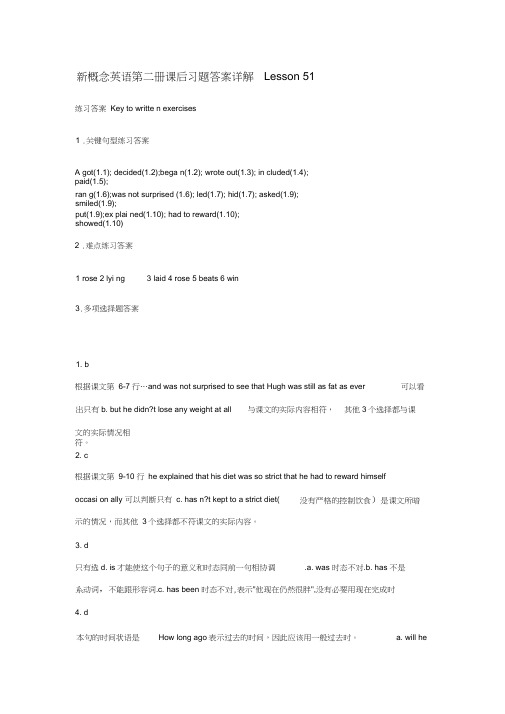
新概念英语第二册课后习题答案详解Lesson 51练习答案Key to writte n exercises1 .关键句型练习答案A got(1.1); decided(1.2);bega n(1.2); wrote out(1.3); in cluded(1.4);paid(1.5);ran g(1.6);was not surprised (1.6); led(1.7); hid(1.7); asked(1.9);smiled(1.9);put(1.9);ex plai ned(1.10); had to reward(1.10);showed(1.10)2 .难点练习答案1 rose2 lyi ng3 laid4 rose5 beats6 win3.多项选择题答案1. b根据课文第6-7 行…and was not surprised to see that Hugh was still as fat as ever 可以看出只有b. but he didn?t lose any weight at all 与课文的实际内容相符,其他3个选择都与课文的实际情况相符。
2. c根据课文第9-10 行he explained that his diet was so strict that he had to reward himselfoccasi on ally 可以判断只有c. has n?t kept to a strict diet( 没有严格的控制饮食)是课文所暗示的情况,而其他3个选择都不符课文的实际内容。
3. d只有选d. is才能使这个句子的意义和时态同前一句相协调.a. was 时态不对.b. has 不是系动词,不能跟形容词.c. has been 时态不对,表示"他现在仍然很胖",没有必要用现在完成时4. d本句的时间状语是How long ago表示过去的时间,因此应该用一般过去时。
新概念英语第三册笔记lesson51-60

Lesson 51无Lesson 52 Mud is Mud 实事求是New words and expression 生词和短语学习词汇时仅知道汉语语义是不够的,要把单词放在语句中体会其应用学习关键句结构是则要把它放在段落结构或文章里mud is mud实事求是同义spade is spade 实事求是fact is factpermanent adj. 永久的~job/house ----temporary临时的tint v. 给...染色一般了解eg. Tint the paper yellow把纸染成黄色delicate adj.淡色的清淡的,雅致的eg. I like the delicate dressshade n.色度荫凉in the shade 在萌凉处shady adj.短语in the shady street / in the shady spotobservant adj.观察力敏锐的grayish adj.浅灰色的light graydispel v.驱散,消除outlandish adj.稀奇古怪的odd/strange/ fantastic , queer , peculiar , weird强调奇异的古怪的,相当于odd 同义eccentric古怪的eg. I can't get along well with the weird. 因为离奇而让人产生奇怪outlandish : queer odd----strange and unpleasant 奇怪也让人感觉到不开心weird: strange and unnatural----difficult to understand不可思议的,荒唐的acquisition n.获得* acquire get gain obtain 获得技能,信息勇气acquire confidence /courage/knowledge/skillsacquisition : the act of acquiringeg. He devotes his time to the acquisition of knowledgedevote one's time to既包括精神上的也包括物质上的the acquisition of sth. (通常形式)Acquiring confidence is essential.The acquisition of confidence is essential.The acquisition of skills is necessary in the modern society.acquirement仅指精神上的获得acquisition可以指泛泛的概念the acquisition/acquirement of knowledge知识的获得the acquisition of money 金钱的获得The acquisition of money is what a large number of people run after.the ~ of sth.cosmetic n.化妆品outrageous adj.无理的He found my offer outrageous.unreasonable irrational illogical ridiculous unpleasant unpleasingfanciful想象出来的imaginableimagining doing / fancying doinginsoluble adj.不可溶解的solve解决insolve 不可溶解*** prompt v.敦促,激励vt. urge sb. to do sth. Persuade sb. to do sth.怂勇某人作某事prompt sb. to doeg. What prompted him to be so generous.什么事情使他这么慷慨大方呢Our discussion prompted some questions.我们的讨论引出了几个问题lead to ; cause ; result in; prompt激励,敦促eg. What prompts you to study English so hard?promptly adv.Prompt : quicktake measure 采取措施eg. He took a prompt measure.He made a prompt decision.他做出了果断的决定。
新概念英语第一册笔记51-60
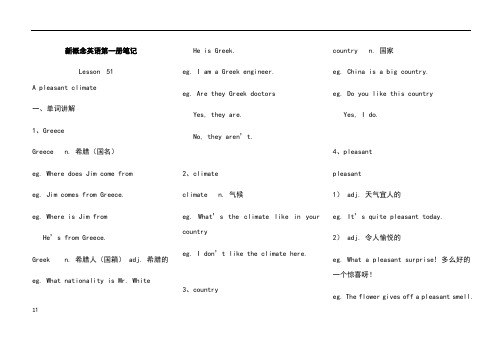
新概念英语第一册笔记Lesson 51A pleasant climate一、单词讲解1、GreeceGreece n. 希腊(国名)eg. Where does Jim come fromeg. Jim comes from Greece.eg. Where is Jim fromHe’s from Greece.Greek n. 希腊人(国箱) adj. 希腊的eg. What nationality is Mr. WhiteHe is Greek.eg. I am a Greek engineer.eg. Are they Greek doctorsYes, they are.No, they aren’t.2、climateclimate n. 气候eg. What’s the climate like in yourcountryeg. I don’t like the climate here.3、countrycountry n. 国家eg. China is a big country.eg. Do you like this countryYes, I do.4、pleasantpleasant1) adj. 天气宜人的eg. It’s quite pleasant today.2) adj. 令人愉悦的eg. What a pleasant surprise! 多么好的一个惊喜呀!eg. The flower gives off a pleasant smell.11这支花散发出一种令人愉悦的香味。
3)adj. 可亲的,友好的eg. Her mother is a pleasant woman. eg. Wendy is very pleasant.a pleasant smile4、weatherweather n. 天气(短时间内天气变化)climate n. 气候(长时间的天气状况)eg. What’s the weather like today good weather 好天气=nice weather weather forecast 天气预报weather bureau 气象局under the weather: not very well or happy感觉不是很好或不是很高兴weather beaten:岁月侵蚀的,饱经风霜的the weather beaten rocks:风雨侵蚀的岩石a weather beaten face:沧桑的脸4、springspring1) n. 春季eg. My father likes spring.eg. Do you like springYes, I do.No, I don’t.2) n. 弹簧5、windywindy adj. 有风的eg. What’s the weather like todayeg. It’s windy.wind n. 风eg. There is much wind today. 今天风很大。
- 1、下载文档前请自行甄别文档内容的完整性,平台不提供额外的编辑、内容补充、找答案等附加服务。
- 2、"仅部分预览"的文档,不可在线预览部分如存在完整性等问题,可反馈申请退款(可完整预览的文档不适用该条件!)。
- 3、如文档侵犯您的权益,请联系客服反馈,我们会尽快为您处理(人工客服工作时间:9:00-18:30)。
新概念第一册51~60课基础测试
一、根据汉语意思完成单词和词组。
c l _ m _ t _ 气候w _ _ t h _ r 天气 c _ _ n t r y 国家
w _ n d y 有风的r _ _ n 下雨w _ _ m 温暖的
s p r _ n g 春天 a _ t _ m n 秋天s _ m m _ r 夏天
s _ m _ t _ m _ s 有时_ l w _ y s 总是s _ _ s _ n 季节
_ n t _ r _ s t _ n g 有趣的 c _ n v _ r s _ t _ _ n 谈话s _ b j _ c t 话题
b _ s t 最h _ _ s _ w _ r k 家务_ s _ _ l l y 通常
t _ g _ t h _ r 一起_ r r _ v _ 到达l _v_ 住,生活
s t_ y 呆在,停留h_ _s_w_ _k 家务l_ _ch 午饭
_ft_ _n_ _n 下午_v_ning 晚上n_ght 夜间
o’ c l _c k 点钟s h_ p商店m _m_ nt片刻,瞬间w _t_ n g p _p _r 信纸shop _s s _ s t_ n t 售货员
s_ z_尺寸,尺码,大小p_ d信笺簿g l u_ 胶水
c h_ _k 粉笔 c h _n g_ 零钱,找给的钱
_n v _lop_ 信封
二、单项选择
1、What’s the weather __________ in Rome?
A. /
B. like
C. do
D. feel
2、All the students in Class One go to school ___________ bus every day.
A. by
B. take
C. buy
D. on
3、Lucy ________ English in our school.
A. teach
B. teaches
C. teachs
D. talks
4、Climate is our favorite subject _________ conversation.
A. to
B. of
C. at
D. in
5、The question is ______________ and I can answer it ___________.
A. easily / easily
B. easy / easy
C. easy / easily
D. easily / easy
6、About _________ books are on show.
A. nine thousands of
B. nine thousand of
C. nine thousand
D. nine thousands
7、—What’s on the plate? —There _________ some jam on it.
A. are
B. is
C. have
D. has
8、__________ sun is shining today.
A. A
B. The
C. /
D. An
9、My father always stays __________ home ____________ Saturdays.
A. at; on
B. in; in
C. at; in
D. in; on
10、What _________ the climate ___________ in your country?
A. does; like
B. is; likes
C. is; like
D. do; likes
三、对划线部分提问
1、They have some whisky. (改为一般疑问句,并作出否定回答)
__________________________________________________________________
2、Mrs. Sawyer is drinking tea in the garden. (对划线部分提问)
_______________________________________________________________________________ 3、My grandmother watches TV in the evening. (改为现在进行时)
______________________________________________________________________________ 4、Tommy and Jimmy come from Canada. (对划线部分提问)
______________________________________________________________________________ 5、The weather is very warm in spring.(对划线部分提问)
______________________________________________________________________________
四、翻译。
1、4月和5月的天气总是暖洋洋的,但是有时下雨。
______________________________________________________________________________ 2、气候非常宜人。
______________________________________________________________________________ 3、此时白天长而夜晚短,太阳升得早而落得晚。
______________________________________________________________________________ 4、我们国家的气候并不很好,但确实很有意思。
______________________________________________________________________________ 5、格林一家居住在国王街2号。
______________________________________________________________________________ 6、格林太太总是在家中吃午饭。
______________________________________________________________________________ 7、What else do you want?
_______________________________________________________________________________ 8、I only have small boxes. Do you want one?
______________________________________________________________________________ 9、The children go to school by car every day, but today, they are going to school on foot.
______________________________________________________________________________ 10、In the afternoon, she usually sees her friends. They often drink tea together.
______________________________________________________________________________。
